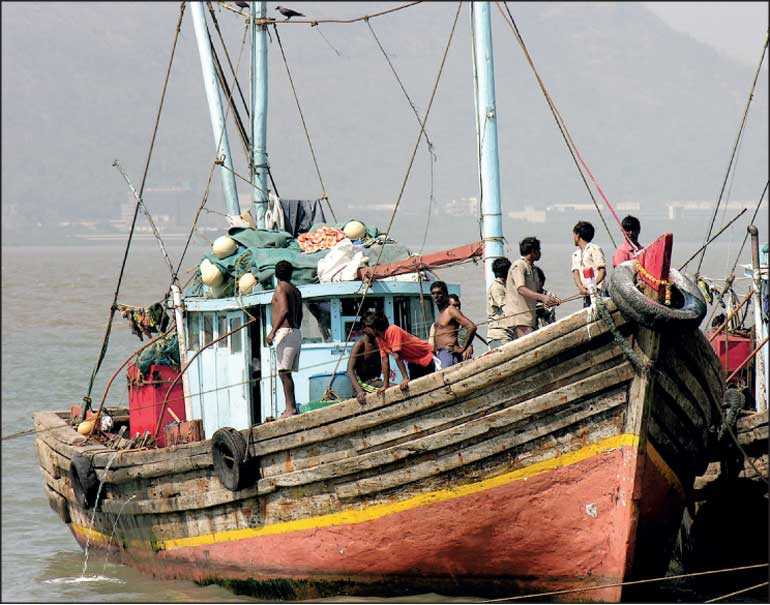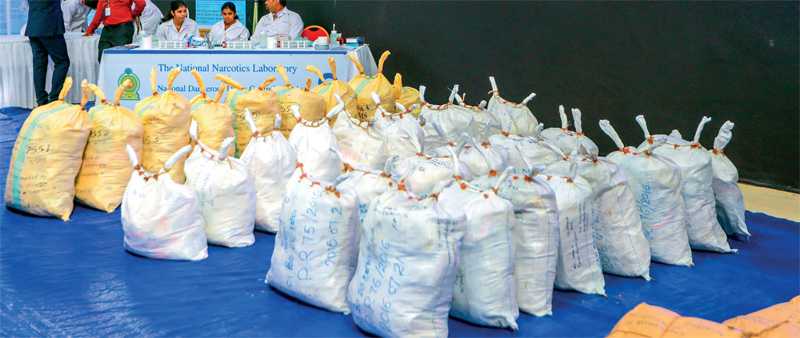Sunday Feb 22, 2026
Sunday Feb 22, 2026
Saturday, 7 November 2020 00:30 - - {{hitsCtrl.values.hits}}

 National security means ability of a state to cater for the protection and defence of its citizenry. It is closely associated with the rights of citizens and the responsibility of the state towards them.
National security means ability of a state to cater for the protection and defence of its citizenry. It is closely associated with the rights of citizens and the responsibility of the state towards them.
Every government should give priority to national security. Initially the primary focus was on focusing on military security but now it encompasses a wide range of non-military dimensions such as economic security, food security, energy security, and environmental security. As Theresa May, the Prime Minister of Great Britain has mentioned, “National security is the first duty of the government”.
Every country’s main duty is to maintain national security and in that case, the military is one of the main tools to protect citizens, nourishing the survival of the state as well as combatting crimes and threats. Everyone needs oxygen to breathe subsequently every nation needs to have an accurate policy to maintain national security since it is the shield of the country.
Sri Lanka
Sri Lanka is the pearl of the Indian Ocean and today faces a range of security threats so easily due to its geostrategic location. Coming almost exactly 10 years after the end of Sri Lanka’s civil war which pitted government forces against a Tamil insurgency led by the Liberation Tigers of Tamil Eelam (LTTE) – Easter Sunday’s Islamic State-inspired bombings shook a country struggling to find its way toward a stable peace.
Sri Lanka suffered a disorienting blow on Easter Sunday, 21 April 2019, when a series of suicide bombings killed over 250 and injured hundreds of more Christian worshippers and foreign tourists. The seven coordinated bombings targeted three Christian churches – in the capital Colombo, north of Colombo in Negombo, and in the eastern town of Batticaloa – and three high-end hotels in Colombo, and later a small guesthouse south of the capital.
This became a massive extremist violence in Sri Lanka but the previous Government’s immediate reaction to the attacks was confused and ignored. Due to the weakness of the former regime, tremendous downfall happened in intelligence services. As a result, many people have been killed in this particular attack. But the current process of the new President’s regime identified the weak points of the former regime and initiated new strategic policies to face for threats.
COVID-19 is an ongoing so-called global health crisis and a major threat for the Sri Lankan Government after the Easter attacks by extremists. The Government with the support of the Health Ministry and Tri-Forces is identifying new clusters using human intelligence and has formed superior strategies.
The Sri Lankan Government together with the military initiated new precautionary measures while protecting citizens’ rights and democracy and rapidly mobilised minimum resources to control the ongoing pandemic with the support of the efficient State-funded health services and the defence professionals under the visionary and able leadership of the President.
This paper tries to identify how the Sri Lanka military maintained national security during COVID-19 and what kind of strategies were taken by them using military capabilities to mitigate crimes while combatting the health crisis to ensure a secure and safe country.
Sri Lanka is one of the countries that successfully secured good healthcare at low costs. She closely monitored the pandemic’s movement right after the first case appeared in the nation and using human intelligence the Tri-Forces tracked any potential COVID-19 suspects and sent them directly to the quarantine centres. While the entire world is engulfed in COVID-19 fear, the Sri Lankan Government, which is taking all possible precautionary measures to contain the virus, has also taken serious measures to combat crimes and threats.
Proactive intervention
“Proactive intervention to prevent any outbreak of COVID-19 within Sri Lanka” is the vision of President Gotabaya Rajapaksa. All preparations and actions of Sri Lanka are within this intent. The Government of Sri Lanka acted well before the pandemic hit the region.
President Gotabaya Rajapaksa appointed Lieutenant General Shavendra Silva as the Head of National Operation Centre for Prevention of COVID-19 Outbreak (NOCPCO) together with the Chief of Defence Staff and Commander of the Army and Medical Specialist Dr. Anil Jasinghe, Director General of Health Services, with their handful of experts taking risk forward, and introduced new strategies to protect people from this health crisis.
The National Task Force was appointed by the Government and they implemented the new approach called 3T (Testing, Tracing, and Treatment) to combat this pandemic. Sri Lanka has no plans to have foreign troops deployed in the country to combat the pandemic. The island nation’s military and police showed their capabilities in tackling the pandemic.
According to Defence Secretary Kamal Gunaratne: “Our military has already shown their expertise and professionalism in handling the emergency created under the coronavirus threat.”
Sri Lankan military is at the forefront of the COVID-19 prevention operations. Also, Sri Lanka’s intelligence agencies have been used to trace people who are closely associated with corona virus-positive patients and the military had rapidly established more quarantine centres around the country and have been praised for their efficiency and the excellent facilities.
As of 23 March, 45 quarantine centres had been built in the country by the Sri Lanka Army. Kandakadu, Punani, Galkanda, Meeyankulan and Welikanda are some of the quarantine centres in Sri Lanka. While Police have managed the curfew, responding curfew rules violators, the military has shouldered the responsibility for the national response from contract tracing to running quarantine centres.
The night Wuhan was locked down, President Gotabaya Rajapaksa formed a special National Task Force to ensure that Sri Lanka is affected only minimally. The President was not only concerned about the health aspects but also of food security. The Government stocked enough food to last the entire year. If the situation is reined in soon, Sri Lanka may have enough even to export. However, the Government had initiated a door-to-door delivery system with the partnership of wholesale dealers and other service providers. The soldiers are under clear instructions to look after civilians in every way possible.
The Sri Lanka Military not only battled the pandemic but faced many after challenges including Terrorism; extremism, maritime security challenges, organised crimes, cyber-attacks, and social media threats are some of the threats dramatically increased in Sri Lanka amidst COVID -19. The Sri Lanka Military is on high alert to maintain national security and ensure the safety of the citizens while controlling the ongoing pandemic.
Drug smugglers and trafficking
Sri Lanka is not a very famous producer or a manufacturer of illicit drugs but as a result of Sri Lanka’s strategic locations, especially on maritime and aviation routes, Sri Lanka has become an international hub for international drug traffickers.
India and Pakistan are the two main origin countries for drug trafficking. Drug smugglers transport heroin, cocaine, and cannabis via illegal migrants or any other human traffickers. Sri Lanka’s military seized this major illicit threat while controlling the virus in Sri Lanka. Likewise, the Sri Lanka military is given a central subject of attention to combatting drug menace. As a result of that visionary plan, the Sri Lankan Military took some measures to crush drug and crime networks operating in prisons too.
The Sri Lanka Navy has displayed the country’s largest-ever drug haul worth of Rs. 12.5 billion nabbed in international waters at the Dikkovita Fisheries Harbour recently. Recently Sri Lanka Naval and Police operations led to apprehending of five suspects with drugs again in Saveewa Pura in Puttalam, Poduwakattu, Mannar, and Pallemunei Districts. In addition on 8 October, the Sri Lanka Navy again apprehended two suspects with over 33kg of Kerala cannabis, during a special coordinated operation conducted at Naruvilikkulam in Mannar.
“Sri Lanka Navy’s detection of this large consignment was the best example to prove that the Government had not neglected its responsibility to protect the country while fighting against COVID-19,” said Major General Kamal Gunaratne.
The Sri Lankan military eradicated terrorism in the country 10 years ago. And now they are committed to another task of combatting drug trafficking and taking speedy measures to nab drug smugglers during the pandemic. Crimes and illegal business have become a major threat to maintaining national security in the country. These issues even affect children and youth of the country, as they are the building blocks and future leaders of the country. If they are influenced at a young age, these kinds of illicit business and habits form them as criminals and it is a duty to combat these crimes.
Illegal fishing
This illicit business has increased during the pandemic since India was marked as one of the topmost countries which severely affected by the pandemic and Indian fishermen have crossed borders for illegal fishing in Sri Lankan waters to harvest its rich resources. Sri Lankan has some threats during this pandemic and the Sri Lanka Navy had taken several measures to prevent illegal migration and illegal border crossing for illegal fishing.
The illegal fishing net is one of the serious threats. The Fisheries Act (1996) implemented by the Ministry of Fisheries and Aquatic Resources strongly prohibits the mentioned illegal fishing method. The use of illegal fishing methods destroys coral reefs, mangroves, mammals, and other endangered species such as turtles. The Mannar District in the north of Sri Lanka is famous for the fishing sector and this sector has been severely affected for the last three decades by the civil war.
On 22 June, the Navy apprehended five persons who were engaging in illegal fishing in Iranativu Island and apprehended two persons engaged in diving to harvest sea cucumber. A total of 37 illegally harvested sea cucumbers, a dinghy, and several sets of diving gear were taken into naval custody on the same day. The same Naval command nabbed another three individuals who returned to the shore after engaging in illegal fishing without valid passes in the sea areas of Thavupadu, Mannar, and Irukkulmpiddi, Talaimannar.
Due to these illegal arrivals and illicit business, all the sea lanes are highly secured and the Sri Lankan Navy is on high alert to safeguard the international and local sea border from drug smugglers and other security threats.
Illegal fishing is one of the most serious threats facing the achievement of sustainable global fisheries and food security. The responsibility doesn’t lie with one country, but with a strong and coordinated effort of international and national players. Illegal unreported and unregulated fishing can be illuminated with more efficient communication between coastal states and fisheries management bodies and more secure and powerful port control systems and more adequate information sharing systems.
Illegal alcohol
Illicitly distilled liquor is a major business in Sri Lanka. Goda, Kasippu, and other illicit spirits, or unrecorded alcohol, are categorised as illegal alcohol and especially consumed by low-income labourers and is widespread all over the country. Among these bootleg liquors Kasippu has become one of the famous illicit spirit businesses and it’s become more popular during the curfew periods due to the pandemic, since the liquor bars were closed all over the region.
The Sri Lanka Military is on high alert during the lockdown period, to mitigate this illicit business and on 11 June, 69 illicit liquor casks (51,750ml) were detected by the Sri Lanka Police. The suspect was a 57-year-old from Kadana. On 2 June, six casks (1,080,000 ml) of ‘Goda’ illicit liquor were detected by Sri Lanka Police Department, and the suspect was found in Pubudugama. Those raids have been conducted by the Sri Lanka Army together with Police with the liquor successfully seized and offenders arrested.
This is a major crime within the country but this has skyrocketed during the pandemic. Sri Lanka’s curfew kept everyone at home due to this pandemic and some are used to engaging in these illegal activities. Sri Lankan military was keen on this subject and stopped people from being criminals.
The Sri Lanka Military protects all citizens not only from the crimes and threats but also from natural catastrophes and according to the Defence Secretary Maj. Gen. Gunaratne: “The responsibility of the Armed Forces is to protect people in events like major natural catastrophes like floods and landslides, terrorism or hostilities and also virus outbreaks like the coronavirus.”
The Sri Lanka Navy has also launched some special sea operations around the country from the beginning of the novel coronavirus pandemic to thwart asylum seekers fleeing from coronavirus-hit countries into Sri Lanka.
Conclusion
Compared to other countries, Sri Lanka has been successful so far in the fighting against COVID-1, since Sri Lanka reacted rapidly to early warnings from WHO and China. However the threat is not over yet. But, as a result of those great strategies, Sri Lanka has been recognised as a successful example by the World Health Organization.
The Sri Lankan military is in the process of maintaining national security while controlling the pandemic. Because of these engagements, the Sri Lankan Military has become one of the leading militaries. They deserve more recognition by the citizens as they not only controlled the pandemic but also stepped out of duty on combatting drug trafficking, terrorism, extremism, illegal fishing, and illegal alcoholism, etc.
References
(www.dw.com), Deutsche Welle. “How Sri Lanka Successfully Curtailed the Coronavirus Pandemic: DW: 18.05.2020.” DW.COM. Accessed July 15, 2020. https://www.dw.com/en/how-sri-lanka-successfully-curtailed-the-coronavirus-pandemic/a-53484299.
“Why Can’t We Go Home?”” Human Rights Watch. October 19, 2018. Accessed July 15, 2020. https://www.hrw.org/report/2018/10/09/why-cant-we-go-home/military-occupation-land-sri-lanka.
TELEGRAPH, Author: COLOMBO. “The Final Threat To Sri Lanka’s National Security Is New Media.” Colombo Telegraph. June 25, 2013. Accessed July 15, 2020. https://www.colombotelegraph.com/index.php/sri-lankas-national-security-concerns-social-media-is-a-threat/.
Gerelt-Od, Soomin Jun and Saranzaya, and Abdullah Ahmadzai. “Notes from Colombo: Sri Lanka Weathers the Covid-19 Storm.” The Asia Foundation. July 09, 2020. Accessed July 15, 2020. https://asiafoundation.org/2020/07/08/notes-from-colombo-sri-lanka-weathers-the-covid-19-storm
Srinivasan, Meera. “COVID-19: Sri Lankan Military Is Helping the Country Fight the Pandemic.” The Hindu. April 15, 2020. Accessed July 15, 2020. https://www.thehindu.com/news/international/covid-19-sri-lankan-military-is-helping-the-country-fight-the-pandemic/article31350778.ece.
“Questions Thrown up by the COVID-19 Crisis in Sri Lanka.” n.d. South Asia Journal. Accessed July 28, 2020. http://southasiajournal.net/questions-thrown-up-by-the-covid-19-crisis-in-sri-lanka/.


[Hiruni Jayaratne is an Intern at the Institute of National Security Studies Sri Lanka (INSSSL), premier think tank on National Security functioning under the aegis of Ministry of Defence. The opinion expressed is her own and not necessarily reflective of the institute.]